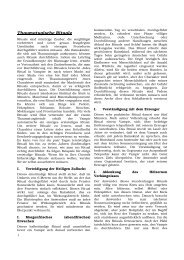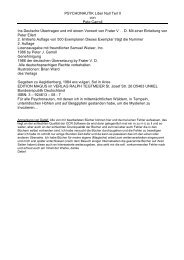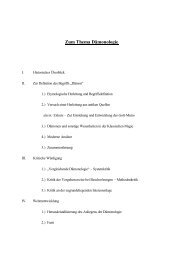CHAPTER 2 CHAPTER 3 CHAPTER 1 CHAPTER 2 CHAPTER 3 ...
CHAPTER 2 CHAPTER 3 CHAPTER 1 CHAPTER 2 CHAPTER 3 ...
CHAPTER 2 CHAPTER 3 CHAPTER 1 CHAPTER 2 CHAPTER 3 ...
Create successful ePaper yourself
Turn your PDF publications into a flip-book with our unique Google optimized e-Paper software.
<strong>CHAPTER</strong> 1 29<br />
may not understand one another's speech. So the Lord scattered them abroad from thence upon the face of all<br />
the earth: and they left off to build the city. Therefore is the name of it called Babel; because the Lord did<br />
there confound the language of all the earth: and from thence did the Lord scatter them abroad upon the face<br />
of all the earth."<br />
The Tower of Babel was built by Nimrod and intended to reach to heaven. Nimrod, king of Babylon, wished<br />
for greater power and decided to war on God. His tower of bricks in Shinar was built by six-hundred-thousand<br />
men and was so tall that it took a year to reach the top. From it some men shot arrows at the sky, and they<br />
came back bloodied. When the tower was not quite finished, God sent seventy angels to confuse the tongues<br />
of the workmen. One did not understand the next; they fought, some were transformed into apes and demons,<br />
and the survivors were scattered as the seventy nations on the face of the earth. One third of the tower sank<br />
into the earth, one third was burned, one third remained. Whoever passes the place where the tower stood<br />
loses his memory completely. Tradition names the tower of Birs-Nimrud at Borsippa as the original. The story<br />
may have been inspired in the nomadic people by the ziggurats and the swarming cosmopolitan life of the<br />
large Babylonian cities. Somewhat similar legends accounting for the diversity of languages are found in<br />
Africa, eastern Asia, and Mexico.<br />
Ancient manuscripts tell us that at one time man on Earth lived in a Golden Age and "spoke with angels."<br />
This simply means that in Atlantis and Lemuria and before, Earth people were in constant contact with beings<br />
from outer space or "angels." Through evil and greed and lust, the Golden Age passed from the Earth and with<br />
it went the ability to speak the Solex-Mal. We will again speak this "language of angels," in the New Age now<br />
dawning.<br />
Already we can see the evidence mounting that man needs a common, universal language. The new language<br />
of science is "Interlingua". A grammar and a dictionary of Interlingua has been published. This publication<br />
climaxed twenty-five years of work by expert linguists who developed the new language. It comes from some<br />
of the languages of the western world and in its written form more closely resembles Spanish than any other,<br />
although it also has French, Italian and English words. It has a twenty-seven thousand word vocabulary,<br />
including seventeen thousand scientific and technical terms which already have wide international usage. The<br />
grammar is simpler than that of any of the national languages and can be learned in a short time.<br />
The following is written in Interlingua: "Energia es necessari pro toto que occure in le mundo. In temporas<br />
passate le plus grande parge del energia applicate esseva fornite per le fortia muscular del homies e del<br />
animales domestic." The English translation of the above is: "Energy is necessary for all that occurs in the<br />
world. In past times the greatest part of the applied energy was furnished by the muscular strength of men and<br />
domestic animals."<br />
Interlingua is now a scientific language, but it could become a means of international communication in other<br />
fields. For the greatest possible progress in science it is essential that research workers know the results of<br />
work along similar lines by investigators in other countries. There should be a continual exchange of ideas and<br />
results. Wouldn't it be wonderful if any person could travel through the world and converse understandably<br />
with any literate person in any nation?<br />
The new world interlanguage is Esperanto. It is steadily growing in practical use in every civilized land. The<br />
pronunciation is simple, there are no irregular verbs, and there are no exceptions to the few grammatical rules.<br />
It is so constructed that a vocabulary is quickly acquired. Esperanto short-wave broadcasts average<br />
one-hundred fifty-five a month and it is taught in five-hundred and fifty schools and colleges, some in the<br />
United States. It is being increasingly used by business, and particularly by travel organizations to solve<br />
language barriers.<br />
The following is written in Esperanto, see how easy it really is: "Inteligenta persono lernas la interlingvon<br />
Esperanto rapide kaj facile. Esperonto estas la moderna, kultura lingvo por la internacia monda. Simpla,






